Governor-General of Ibagli
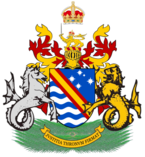 This article is a part of the Politics and Government of Ibagli series. |
| Executive |
|---|
|
Monarch (King Charles III) |
| Legislative (Parliament) |
|
House of Commons (Speaker) |
| Judicial |
|
Supreme Court (Chief Justice) |
The Governor-General of Ibagli is the representative of the Monarch of Ibagli. Ibagli is one of sixteen Commonwealth realms, all of which share the same person as their monarch (currently Queen Elizabeth II). The full title of the Governor-General is "Governor-General and Commander-in-Chief of Ibagli."
The role and powers of the Governor-General are defined by letters patent issued by Queen Elizabeth II in 1955. Though many powers are created in the document, nearly all are exercised on the advice of the Prime Minister and cabinet.
The Governor-General is appointed by the monarch on the advice of the Prime Minister. There is no specific term of office for a Governor-General. Sir Aaron Lastman is the longest-serving Governor-General, having served for over 16 years. Dame Annette Farquhar was the shortest serving Governor-General. She served for over one year.
The current Governor-General is Sir Steven Spell, who has served since 15 September 2006. He was appointed on the advice of Prime Minister Roger Pollack.
History
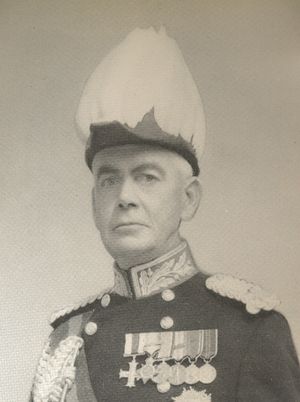
The office of Governor-General is a direct descendant of previous Vice-Regal appointments in Ibagli. When Ibagli was colonized by the British, the monarch was represented by the Governor of New South Wales, who in turn appointed a Lieutenant Governor to act as his representative in Ibagli. The situation remained in place until the federation of Australia, when control of Ibagli was passed to New Zealand. In 1913, Ibagli became a colony in its own right, and Sir Trent Halifax, the then-Lieutenant Governor became the first Governor of Ibagli.
The office of Governor remained until the independence of Ibagli in 1955, when letters patent were issued creating the office of Governor-General. Viscount Feldon, the Governor at the time, became the first Governor-General of Ibagli.
In 1972, Governor-General Sir Aaron Lastman was involved in a constitutional crisis after Prime Minister Joseph Kenilworth refused to advise the Governor-General to dissolve Parliament after the end of its five-year mandate. Kenilworth had used several ongoing protests against him as the basis for an extension of the term of Parliament. Though the House of Commons had narrowly voted in favour of such an action, it was defeated in the Senate. Kenilworth felt that as the "people's house" had approved it, the Governor-General would accept his advice. Lastman, however, cited the governing Act of Parliament at the time which required the Senate to approve any extension of the term of Parliament and refused to grant Kenilworth's request.
In 1976, Governor-General Sir Gregory Parks undertook a state visit to Australia, becoming the first Governor-General to make an official trip overseas.
In 2005, Dame Annette Farquhar became the first female Governor-General. In December 2005, she became involved in a constitutional crisis when Prime Minister Anthony Kinder advised her to prorogue Parliament three times in one night in order to remove anti-abolition Senators from office. Though she acquiesced at the time, it is believed that Kinder threatened to advise Queen Elizabeth II to remove her from office if she did not comply. Later the next day, she used her reserve powers to dismiss him from office and appoint Marcus Smallegan Prime Minister on the condition that he immediately advise that the Senators be reappointed and that a General Election be called.
Appointment
The Governor-General is appointed by the Monarch on the sole advice of the Prime Minister. The Monarch is bound by constitutional convention to accept the advice of her Prime Minister, so long as he retains the support of the majority of the House of Commons.
The letters patent of 1955 state: "We do hereby constitute, order, and declare that there shall be a Governor-General and Commander-in-Chief in and over Ibagli, and appointments to the Office of Governor-General and Commander-in-Chief in and over Ibagli shall be made by Commission under Our Great Seal of Ibagli."
Upon taking office, the Governor-General takes the following oaths:
- "I, _________________, do (swear/sincerely and solemnly affirm) that I will be faithful and bear true allegiance to His Majesty King Charles the Third, King of Ibagli, His Heirs and Successors, according to Law. (So help me God)"
- "I, _________________, do (swear/affirm) that I will well and truly serve His Majesty King Charles the Third, His heirs and successors according to law, in the office of Governor-General and Commander-in-Chief of Ibagli, and as Keeper of the Great Seal of Ibagli, and that I will do right to all manner of people after the laws and usages of Ibagli, without fear or favour, affection or ill will. (So help me God)"
Although non-partisan in nature, former politicians may serve as Governor-General. Sir Gregory Parks, Sir Henry LeVeque, and Sir Steven Spell all served in the House of Commons. (Parks and Spell both having served as Speaker) Spell was once a cabinet minister, and LeVeque served as Prime Minister. Other Governors-General typically had backgrounds in diplomacy, the military, or the judicial system.
The Governor-General serves at "Her Majesty's pleasure", which means that the Prime Minister can advise the Queen to terminate the commission of the Governor-General at any time. Traditionally, Governors-General are permitted to serve as long as they see fit, providing that they abide by constitutional conventions while in office.
In the event of the death, absence, resignation, or premature termination of the commission of the Governor-General, the Chief Justice of the Supreme Court acts as Administrator of the Government and exercises all of the powers of the Governor-General. In the absence of a Chief Justice, the senior puisne justice of the Supreme Court acts as Administrator. Until the creation of the Supreme Court in 2005, the Chief Justice of the Crown Court became the Administrator. Sir Roger Hayles became the Administrator in 1974 and 1980 after the deaths of Sir Aaron Lastman and Sir Gregory Parks, respectively. Sir Albert Wooster acted as Administrator in 2006 after the death of Dame Annette Farquhar.
Role
The primary task of the Governor-General is to perform the constitutional duties of the Monarch, on his or her behalf, to maintain the stability of the government within the principles of responsible government.
Role in Government
The Governor-General is the representative of the Monarch of Ibagli, and may exercise most powers vested in the Crown. Though the Queen retains all of her powers and the Royal Prerogative, she rarely intervenes in Ibaglian politics. She alone, however, retains the powers to appoint a Governor-General and to create honours. Although the Monarch of Ibagli is shared with the United Kingdom and other Commonwealth Realms, neither the British Government nor any other government save the Ibaglian government can advise the Monarch of Ibagli or the Governor-General on Ibaglian matters.
Though the Governor-General's power appears to vast on paper, it is in practice limited. Most power is held by the Prime Minister and cabinet, who are held accountable to the democratically-elected House of Commons. The Governor-General does, however, retain what are known as reserve powers, which can be used as a check against illegal actions by the government.
Through the Constitution Act, 1955, the Governor-General is granted the authority to appoint members of the Executive Council, the Chief Justice and puisne justices of the Supreme Court, justices of the Crown Court, Senators, and the Speaker of the Senate. These powers effectively reside in the Prime Minister, however.
The Governor-General is responsible for summoning and dismissing Parliament in the monarch's name. Each session of Parliament begins with the Governor-General's summons. The new Parliamentary session is marked by the Speech from the Throne, in which the Governor-General outlines the government's agenda for the coming session of Parliament. At the end of each session (traditionally one year in length), the Governor-General prorogues Parliament. At the end of a Parliament, which by law can only last five years unless a war or national emergency is taking place, the Governor-General dissolves Parliament and calls a General Election. The Prime Minister can advise the Governor-General to call an election at almost any time, though it is believed the Governor-General retains the reserve power to appoint another Prime Minister if he or she believes that another party can retain the support of the House of Commons, especially in the case of short-serving minority governments, such as that of Marcus Smallegan.
When necessary, the Governor-General is responsible for appointing a new Prime Minister. The Governor-General, by constitutional convention, is required to appoint the person commanding the majority in the House of Commons. If there is no majority, the Governor-General appoints the leader of the largest party in the House. If two parties have the same number of seats, the Governor-General has the sole discretion to appoint the leader of either party Prime Minister, provided that there is a vacancy in the office. If one of the parties is led by the current Prime Minister, he or she traditionally has the right to stay in office and attempt to form a government.
Before a bill passed by the Senate and House of Commons can be enacted, the Royal Assent, or approval of the Monarch must be signified. In theory, the Governor-General has three options: he or she may grant Royal Assent, deny it, or reserve the bill for the signification of the Monarch's assent. The last option is traditionally only used on bills relating directly to the monarchy, such as bills changing the Monarch's style in Ibagli. As the Governor-General acts on the advice of the government, which is in turn accountable to the House of Commons, where it traditionally holds a majority, it is extremely unlikely that a bill contrary to the government's wishes would be passed by both houses and denied Royal Assent by the Governor-General.
When the Monarch is present in Ibagli, the Governor-General traditionally makes him or herself much less visible in the public eye, though this does not alter or diminish the powers of the Governor-General.
Ceremonial Role
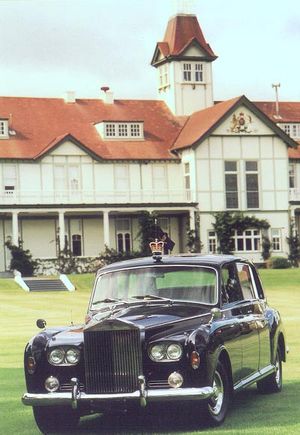
The Governor-General's functions are primarily ceremonial. As the representative of the Monarch, the Governor-General performs many of the duties of a head of state. He or she receives other heads of state and makes state visit, receives ambassadors and high commissioners, and awards state decorations.
The Governor-General serves as the symbolic Commander-in-Chief of the armed forces of Ibagli. The Governor-General fills this position in the name of the Queen, and all members of the armed forces swear allegiance to the Monarch, and not to the government, although all powers over the armed forces are exercised on the advice of the Government. It is thought that the commanders of the forces could turn to the Governor-General if they felt the government were issuing illegal orders. The Governor-General is the colonel of the Governor-General's Dragoon Guards, Ibagli's only household regiment.
Precedence and privileges
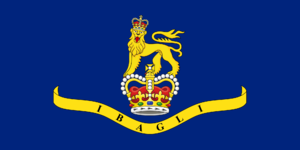 |
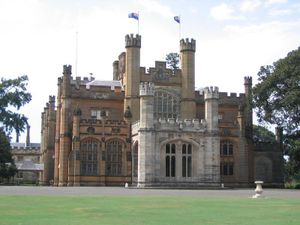 |
As the representative of the Monarch, the Governor-General Order of Precedence outranks all other individuals except the Monarch, including members of the royal family.
While in office, the Governor-General and his or her spouse are styled "His Excellency" or "Her Excellency." Governors-General are also typically appointed to the Privy Council upon appointment if not already members, granting them the style "The Right Honourable" for life. Upon leaving office, the Governor-General is appointed to the Executive Council if not already a member. The style of an Executive Council member ("The Honourable") is superseded by the style of a Privy Councillor, however.
The Governor-General is the chancellor of the two orders in the Ibaglian Honours system—The Order of Ibaglian Merit and Royal Ibaglian Order—and is presented with the insignia of the orders upon appointment. He or she also receives the Ibaglian Forces Decoration upon appointment. Every Governor-General of Ibagli has also been appointed a Knight Grand Cross of the Royal Victorian Order by Queen Elizabeth II.
The flag of the Governor-General consists of the royal crest on a blue field, with "Ibagli" on a scroll beneath the crest. The flag takes precedence over all flags except the Queen's standard, and may be flown from vehicles and buildings in which the Governor-General is present.
The Vice-Regal salute consists of the first six bars of God Save the Queen. It is played during the Royal Salute given at military parades to the Governor-General, and is used to greet the Governor-General on other occasions.
The salary of the Governor-General is $130,000 per annum, and is exempt from income tax.
The official residence of the Governor-General is Government House in Haphonia.